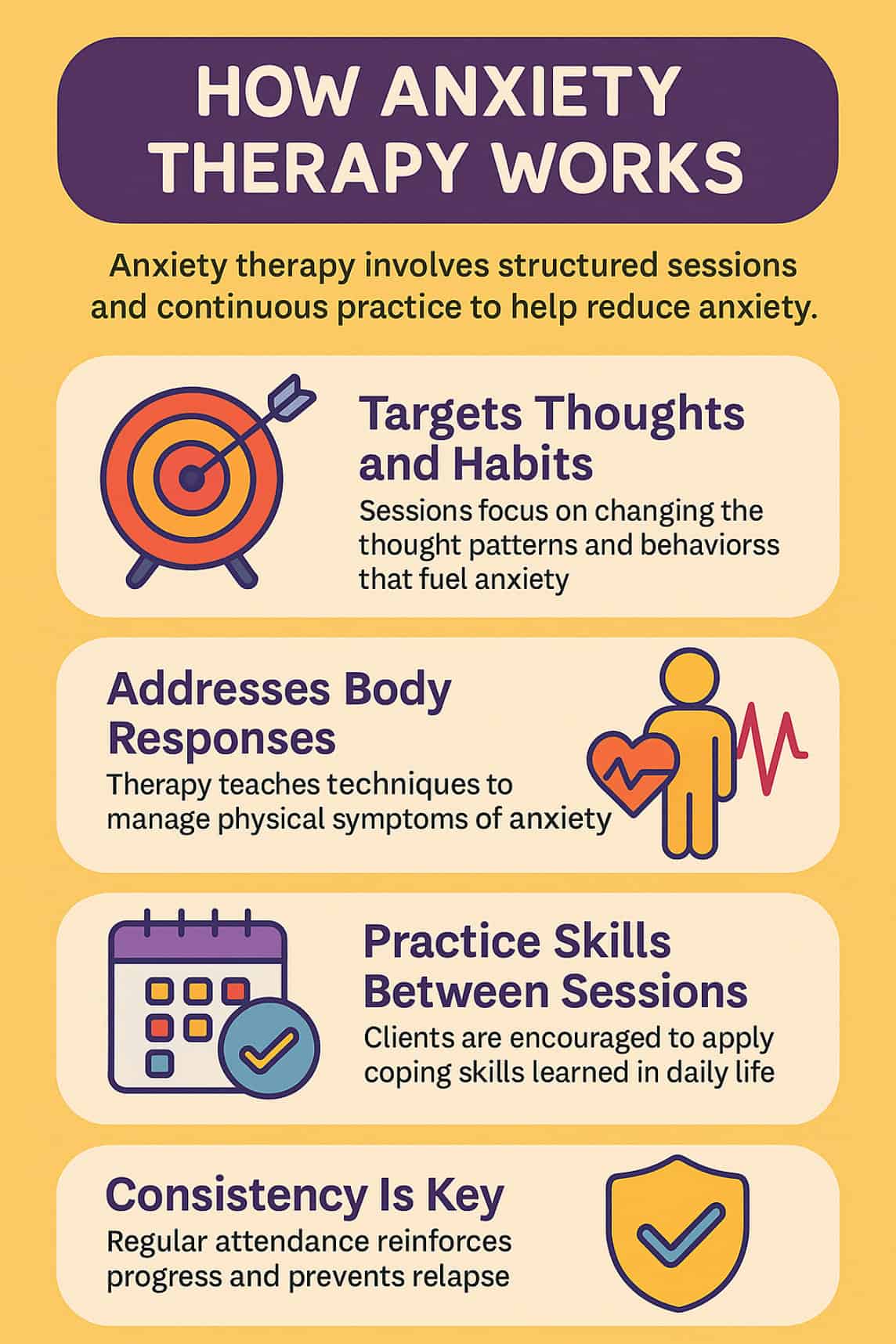
Key Takeaways for How Anxiety Therapy Works.
- Anxiety therapy targets thoughts, body cues, and habits that fuel anxiety.
- Techniques are learned in session and practised between appointments.
- Regular attendance builds momentum and strengthens relapse prevention.
- Common methods include CBT, ACT, and exposure therapy.
- Therapy supports sober living by replacing avoidance and substance use with healthier coping strategies.
🎯 The more consistently you engage, the stronger and longer-lasting the results.
👉 Ready to take the next step? Learn more about anxiety therapy at AERCS and how to book your free 15-minute phone consultation.

Anxiety therapy works by teaching you evidence-based ways to calm your mind and body, change anxious thinking, and replace unhelpful coping habits with healthier ones, all while your therapist guides and supports you from session to session. Within a structured plan, anxiety therapy targets the thoughts, body cues, and behaviours that keep worry spinning so you can feel steady and stay sober.
What Anxiety Therapy Looks Like Week to Week.
A Roadmap, Not Random Chat.
Your therapist will start with an assessment, then outline clear goals and a session-by-session plan. Each meeting follows a predictable arc: a quick check-in, a review of skills you practised, new techniques, and a brief wrap-up with homework. Knowing the roadmap reduces guesswork and keeps progress measurable.
Three Core Targets.
- Thoughts – identifying and challenging worst-case predictions.
- Body Cues – breathing, progressive muscle relaxation, and grounding.
- Habits – shifting avoidant or substance-based coping toward healthy routines.
Consistently addressing all three pillars is what separates effective therapy from inspirational talk.
Evidence-Based Methods You Will Likely Encounter.
| Therapy Style | Main Focus | Why It Helps Anxiety | Bonus for Sobriety |
|---|---|---|---|
| Cognitive Behavioural Therapy (CBT) | Challenge fearful thoughts and run behavioural experiments | Proven to reduce anxiety symptoms in multiple meta-analyses | Reframes cravings as thoughts you can test |
| Exposure Therapy | Gradual, planned contact with feared cues | Lowers fear by teaching the brain you are safe | Shows you can face discomfort without substances |
| Acceptance and Commitment Therapy (ACT) | Mindfulness and values-driven action | Builds tolerance for anxious feelings | Encourages sober actions that match values |
| Mindfulness-Based Skills | Non-judgemental attention to the present | Reduces rumination and stress hormones | Strong relapse-prevention tool |
Why Between-Session Practice Matters.
Therapy hour is only 1 out of 168 hours in your week. Research shows that skills rehearsed daily predict bigger gains and fewer relapses. Try these ideas:
- Micro-practise breathing while waiting at a red light.
- Thought record on your phone after a difficult work call.
- Safe friend check-ins before and after exposure tasks.
Small, repeated reps shift neural pathways far faster than discussion alone.
Attendance Consistency: The Unsung Hero.
Skipping sessions stalls momentum and can raise relapse risk. A StatCan report shows that only 48.8% of Canadians with a mood, anxiety, or substance disorder spoke to a professional in the past year. Regular attendance bridges that gap by:
- Keeping goals top of mind.
- Allowing quick tweaks when anxiety spikes.
- Reinforcing sober coping strategies before old habits resurface.
How Anxiety Therapy Supports Sober Living.
- Early-warning system – you learn to spot anxiety cues that used to trigger drinking or vaping.
- Replacement routines – exercise, journalling, and social support fill the space previously held by substances.
- Values focus – therapy links calm living with long-term goals like career growth and family connection.
Over time, anxiety reduction strengthens relapse prevention, and sobriety boosts therapy results in a virtuous cycle.
Quick Stats that May Encourage You.
- One in five Canadians experiences a mental illness in any given year, according to CAMH.
- More than 5 million Canadians met criteria for a mood, anxiety, or substance disorder in 2022 Statistics Canada report.
These numbers remind people that you are not alone and that proven help exists.
Putting It All Together.
Anxiety therapy demystifies your worries by tackling unhelpful thoughts, calming body cues, and rewiring habits. Skills you learn in session come alive through consistent practice during the week, and staying the course tightens the link between reduced anxiety and rock-solid sobriety.
Ready to move from theory to action? Visit our Anxiety Therapy page and how to book your complimentary 15-minute phone consultation. Let’s chart your personalised path to calm, clear living.
What is anxiety therapy in simple terms?
Anxiety therapy is a structured, evidence-based process that teaches you to manage anxious thoughts, body cues, and behaviours.
How long does anxiety therapy take to show results?
Many clients notice early shifts within six to eight anxiety therapy sessions, with bigger gains over three to six months.
Does anxiety therapy always use CBT?
CBT is common, but anxiety therapy can also include exposure, ACT, mindfulness, or a blend tailored to your needs.
Can I do anxiety therapy online?
Yes, virtual anxiety therapy delivers similar outcomes to in-person sessions, provided you have a private space and stable internet.
Will my insurance cover anxiety therapy in Ontario?
Many extended-health plans reimburse sessions with registered providers, so check your policy or ask your therapist before starting anxiety therapy.
Do You Need Anxiety Therapy?
Take this quick self-assessment to see if anxiety therapy could help you manage symptoms.Note: This questionnaire is educational only and does not replace a clinical assessment. If you wish to obtain professional guidance, please follow up with a licensed mental health professional.

